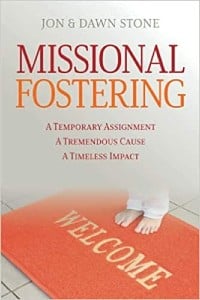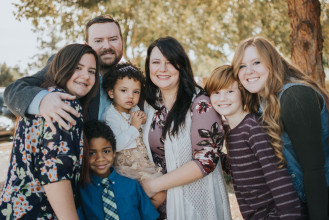
The War of Words
In this Adventures in Odyssey drama, a carelessly uttered word from Eugene creates havoc as it becomes the fashionable insult, resulting in a lesson about the power of words.
Home » Episodes » Focus on the Family Broadcast » Foster Care: Making a Difference During the Formative Years
Dawn Stone: And I can’t help but think, “We did have a choice.” We didn’t have to take him. He was messy. He was hard. Um, our lives changed completely. But if we didn’t take him, if we said “no,” what would’ve happened? I think the trajectory of his life changed. I know our lives have-
Jim: Yeah.
Dawn: … forever been changed.
Jim: Yeah.
Dawn: We can’t even begin to explain all the ways God changed our hearts.
John Fuller: That’s Dawn Stone touching on the way that God can work on your heart through foster care. She and her husband Jon join us today on Focus on the Family. And your host is Focus president and author Jim Daly. I’m John Fuller.
Jim Daly: John, when we think of foster care, we’ve had a few programs here at Focus to talk about it. Um, let me give it some scope and dimension. There’s probably about 410, 420,000 kids in the foster care program across the US. Generally, the bigger the state, the more children are in the foster system. Here in Colorado, it’s about a thousand children. Texas, probably 26, 27,000. California would be similar. Florida, New York, bigger states, more children, obviously. I think the, uh, you know, the situation with, uh, drugs flowing into the country, et cetera, has exacerbated the foster care system. A lot of parents go into drug rehab, and their kids need a place to stay, so that’s, uh, you know, a common situation in foster care today. I remember, uh, we started Wait No More, our foster initiative here at Focus on the Family, a number of years ago. (laughs) And th-, I just, I laugh because I got home, and Jean had heard the broadcast, and I was asking people to get involved, and she said, “Well, if you’re gonna ask people to get involved, we should get involved.” And I was like, “No, no, no. I’ve already done my time.”
John: (laughs)
Jim: “I was a foster kid.”
John: I gave us the office.
Jim: “I don’t wanna be a foster parent.” And she said, “That doesn’t make sense to me. We need to get licensed. Let’s do it.” “Yes, ma’am.” (laughs) And so, uh, for those, particularly husbands, that might drag their feet, I’m with you. I get it. But I’ll tell you what. The, uh, successes that we saw, um, were terrific. Wasn’t easy at times. There were obviously some of the, uh, failures were there as well. But we’re gonna talk about that today, really, to encourage you to consider engaging in the foster care movement at some level.
John: Yeah. And husbands, don’t ignore that prompting God might have for you-
Jim: (laughs) There you go.
John: … through your wife. There’s a great adventure ahead. I think you’ll hear a lot of hope. Um, some of the difficult things that, uh, foster care involves as well. We have Jon and Dawn Stone. Uh, they have, uh, uh, a long history of being involved with kids. Uh, Jon has been a pastor for more than 30 years. Uh, he and Dawn moved to Indiana in 2022 to pursue missions. And, uh, they have three kids. They’ve been Mom and Pops to 41-
Jon: Mm-hmm.
John: … I think, foster kids in their home, and that inspired them to write the book, Missional Fostering: A Temporary Assignment, A Tremendous Cause, A Timeless Impact. Stop by focusonthefamily.com/broadcast, or call 1-800, the letter A, and the word FAMILY, for your copy.
Jim: Well, Jon and Dawn, welcome to Focus. Good to have you.
Jon Stone: Thank you.
Dawn: Thank you.
Jim: And we’re looking forward to talking more about this great topic. Now, Jean, this is the one when I’m at home and I’m saying, “Yeah, we’re gonna do something on foster care,” she’s like, “Oh, I’d love to join.”
John: (laughs)
Jim: And so we have Jean joining us today.
Jon: Yay.
Jean: Yay. It’s great to be here.
Jon: The more the merrier.
Jean: (laughs) Yeah.
Jim: The more the merrier, and, uh, you know, Jean, again, she just brings great perspective on this topic, especially. Uh, you’ve been fostering, as John said, uh, for a long time now. You’ve been engaged in the fostering community. Describe the need for fostering today. I tried to give it a little contour, but, um, how did you develop the concept of missional foster care? Which is great. You know, the missions field.
Jon: Mm-hmm. Well, apparently, our editor told us missional was not officially a word in the dictionary, so we’re hoping Mr. Webster will read the book.
Jim: Are there rules anymore to-
John: (laughs)
Jean: (laughs)
Jim: … what you can say and not say?
Jon: Apparently. (laughs) So we have-
Jim: (laughs)
John: (laughs)
Jim: I didn’t know that.
Jon: Well, we do for the church culture. They would understand the idea. And it explains what Dawn and I felt about fostering. Now, I know she’ll tell her story. She’s always wanted to foster. She’s a second-generation fostering parent. But for me, it was new. And, um, for us, it was God asking us to step in for a period in a child’s life when they needed it, not necessarily because we had an emptiness in our life and we needed to fill that with another child. So it was very missional for us. It was a, a post, a-
Jim: Yeah.
Jon: … an assignment. It was, it was, I think, the best way that, to describe it in my mind was, um, at Christmas, the stores will put up seasonal help, help wanted, um, you know that when you sign up for that job, you’re not gonna be there forever. You’re just filling a need in a spot. And that’s what missional fostering was to us.
Jim: Yeah. And that just paints a picture of that. Uh, I appreciate the fact that you were hesitant, that you weren’t, that wasn’t the direction your eyes-
Jon: Mm-hmm.
Jim: … were set on, and then Dawn kinda sprung this on you. D- describe that.
Jon: So our youngest was going into high school. Um, so I looked at her and said, “Babe, you’ve been a rockstar. You have just taken it for the team.”
Jim: (laughs)
Jon: “What do you want to do? What do you, what do you wanna do when you grow up, right?”
Jean: (laughs) Right.
Jon: “What do you wanna do with your life?” I was thinking she was gonna do music or masters or something and she said: ‘I wanna be a foster mom,’ and I was like, oh man, note to self, don’t ask Dawn questions-
Dawn: Right.
Jon: You don’t know the answers to, right? So, then God did three things, um, in my life to help put his desires for fostering in our heart. At our church, we had a testimony time once a month. Have somebody come up and talk about how God saved them. And- and a sergeant major from the Air Force stood up, and her name was Infinity. And she stood up and she said, “Well, I came to Christ, uh, when I was in foster care.” And I just dropped my mouth.
Jim: Ooh.
Jon: I wouldn’t look at Dawn. I felt like her eyes-
Jim: (laughs) Yeah, sure.
Jon: … were peering at me.
Jim: See?
Jon: ‘Cause … yeah.
Jim: (laughs)
Jon: I wouldn’t look at- I wouldn’t acknowledge it. I was just thinking, “God, really? Is that what you had for today?” And then I go into Starbucks, and for us guys, g- walking into Starbucks, we, um, we meet people and so, uh, I was talking to a guy and he said, um, “Oh, I- I work for a foster agency.”
Jean: (laughs) Wow.
Jon: Like, really?
John: (laughs)
Jon: And, uh, this is two times, and I’m wondering, is God doing this? And then the third thing, and this is the straw that broke the camel’s back for us. Our youngest son, Jason, was playing basketball in the yard, and we said, uh, “Hey, Jace, what don’t you invite your buds to come to youth group tonight? Wednesday, invite your buds.” And so he did, and- and the boys that he invited were foster kids, and they were down the street. And, uh, there were three kids, and we invited them. And the boy said, “Well, my foster mom is an atheist, so we probably aren’t going to be able to come.” And that is when it hit me. If Christ followers don’t step into this space, who is? That’s when I went in, I don’t know what I told her. Um, but that’s when we decided we need to jump in the pool.
Jim: Dawn, obviously, you had a heart bent in this direction. I mean, it’s amazing and patient of you to wait for the right moment in your family’s phase of life to say, “Okay, I’ve got an answer, Jon. Here’s the answer.” “What?”
Jon: (laughs)
Jim: But, um, y- you had an experience with one of your foster children, I think she- you nicknamed her Tropical Storm Ally, that kind of sets it up.
Jon: (laughs)
Jim: I don’t have to say much more. What happened?
Dawn: Hmm. Ally was an adorable 10-year-old. She came in with a bubbly personality and just won us over right away. She would tell dad jokes-
John: (laughs)
Dawn: That just, I mean, dads would be embarrassed that they couldn’t keep up with her. Um. For the first 24 hours, and then, I brought her to school the next day, and she … I got a call from the school about 10 o’clock in the morning saying she said she threw up and she needs to come home. So I went to the school and picked her up and come to find out she had lied about throwing up because she didn’t want to be at school.
Jim: Sure.
Dawn: She did have a bubbly personality as long as everything was going her way.
Jim: Hmm.
Dawn: But one thing would just trigger her and she would go off. Well, about two weeks in, I got a phone call saying, “you need to bring some reinforcements,” and I arrived at the school, and there were adults all around the lobby shielding their stuff, shielding the computers, shielding, um, other children from Ally.
Jim: Hmm.
Dawn: She was like the Tasmanian devil. Just destroying everything in her path. She had poured milk on the computer keyboards-
Jon: Keyboard. Yeah.
Dawn: Yes. And, um, I watched her pick up a chair and try to knock down the Christmas tree that was set up in the lobby. Just total destruction. And God really used Ally to teach us an amazing story of grace.
Jon: This was by far the hardest case. Um, and not all of them were this way, but this girl exacerbated her behaviors. We dropped her off one day for a birthday party, and she goes in, uh, she’s 10. Um, we, at- at another foster parent, so we felt like we were being prudent parents. She was with somebody-
Jean: Right.
Jon: Who was trauma informed and- and trauma trained, and so we are … probably have dropped her off, we’re 45 minutes down the road or away, and all of a sudden we get a phone call saying, “You need to come back.” And I walk in and she’s been triggered. The 10 year old girl’s been triggered. And she had had leukemia.
Jim: Mm-hmm.
Jon: She has had a port inside of her at 10 years old. She’s already … her parents have turned her in to foster care. Her aunt who adopted her has turned her back into foster care. I mean-
Jim: All that rejection.
Jon: No one-
Jim: Yeah.
Jon: No one- and- and this girl has control issues, and it’s like she can control nothing in her life, so the rejection. She’s just in a sad shape. I walk into the house. As I walk in, she’s got a printer over her head, and she throws it down on the ground. And I am thinking, “I’ll bet I’m going to have to pay for that.” That-
Dawn: Right.
Jon: What are we going to do here? And, uh, she immediately flees the scene, and she runs into the bedroom. And then she crawls under the bed like a mechanic on a stroller.
Jim: Yeah.
Jon: You know, he’s got his head under the bed and she’s got her arm around the bedpost. And so, um, the dad of the home and I walk in, and we say, “Okay, um, Ally, it’s time to go,” and she’s not wanting to go. “I want to stay.” And- and she … no matter what we can say, we can’t get her to leave. And that’s when God put words into my mouth that were not in my brain.
Jim: Hmm.
Jon: And they were not a part of my theological background. And that’s when God said, “Give her grace. Give her a, something she doesn’t deserve.” And words came out of my mouth that I couldn’t filter, and I looked at her and said, “Ally, let’s go get a maple donut from Krispy Kreme.” She immediately let go of the rail, got out from under the bed, look at me, and said, “Wait. I don’t deserve that.”
Jean: Mm-hmm.
Jon: And I said, “Ally, you don’t deserve it. But that’s God’s grace, getting something that we don’t deserve.”
Jim: Yeah.
Jon: And that was a hard lesson to learn for us, to think of, um, how can we give something so scandalous as this amazing grace when somebody doesn’t deserve it?
Jim: So good.
John: What a beautiful story. And, um, we’re talking today on Focus on the Family with Jon and Dawn Stone, and, uh, they have stepped up. They’ve said, “yes, Lord,” and they’ve captured their heart and some stories in a great book called Missional Fostering: A Temporary Assignment, A Tremendous Cause, A Timeless Impact. Uh, get a copy from us here at the ministry when you call 800, the letter A, and the word FAMILY. 800-232-6459, or stop by focusonthefamily.com/broadcast.
Jim: Jean, I’m thinking of many stories, but you had that experience, too, uh, where we had one of the foster kids who loved to put water outside the tub-
Jean: (laughs)
Jim: All over the place, and, you know, I think when you- with bio children, you know, you can control the environment, you have boundaries, you have the house rules. You know, those kind of things. And, uh, and then, you know, someone comes into that environment and what they need is grace.
Jon: Mm-hmm.
Jim: It’s a hard gear to change to.
Jon: Mm-hmm.
Jim: Uh, but it’s right. What was your experience with that?
Jean: Well, this particular child acted out frequently, but it was really quite subtly. And they loved, uh, splashing wildly. Not in a fun way.
Jim: (laughs)
Jean: You know, to make a mess of the- the bathroom. And as always, I would say, “Oh, you know, you can splash, but if you could splash a little less, that would- that would be great.”
Jim: (laughs)
Jean: And, oh, they just started, you know, going crazy. And, again, not in a fun way. Splashing all over the place. And- and I sensed at that moment the Holy Spirit saying to me, “Really? You’re irritated about soapy water all over your bathroom? Let’s take a minute and think about what this child of mine has been through.”
Jim: Mm-hmm. Mm-hmm.
Dawn: Yeah.
Jean: And, I mean, it was that moment, everything changed for me. Everything. And I learned to show unconditional love to that child and to all the foster kids. That is the moment I became a really good foster parent. It wasn’t about me.
Jon: Right.
Jean: Wasn’t about them listening or the- even the outcome.
Jon: Mm-hmm.
Jean: And it- things did really change with that child. But even if they hadn’t, even if they hadn’t, I’m called. We are called to show them Christ’s just amazing grace and love for them.
Jim: Well, and the bottom line is, and I so appreciate that emotion, Jean. I mean, the bottom line is, we- we (laughs) are selfish people, being human beings.
Jean: Yes.
Jim: And when you’re fostering, boy, they bring in so many difficulties, as our staff member, Dr. Sharon Ford, who heads this area up, has often said, these children just need to taste and feel the love of God.
Jean: Mm-hmm.
Jim: And she, when she worked for the state of Colorado, she, you know, would just yearn for more Christian families to be engaged because that’s where they felt the most loved. And that’s a good thing. Uh, tell us about Shane and the impact he had on your home.
Dawn: Shane came to us at 17 months old, and he was non-verbal, and he had faced severe neglect. And he, his only word he would say was “hi.” And he was very filthy. He had pinkeye in both eyes, so we spent- so I’m at the emergency room right away. Um, he wasn’t used to any structure at all. So, taking him to church was a challenge. Um, the first time we brought him to church, I left him in his stroller and I asked a lady to just walk him around the lobby because he was not ready to handle the nursery. The next week, when I brought him to the nursery, he hit everyone in nursery with matchbox cars and blocks, and … He was with us for six days, and those first six days, I don’t think we slept at all because he would climb out of the crib in the middle of the night. Fast forward a little bit, maybe a month later, they said, “We’re still trying to find a home,” and I said, “Well, it’s okay, let’s just leave him here because he was wiggling his little messy way into our hearts.”
Jim: Uh-huh.
Dawn: And by the second month, I had completely fallen in love with him. I was totally smitten. He … we found out he had a little sister that was also placed in another foster home at the same time. So, we got to know that foster family, and we became friends with them, and we started setting up play dates. They wanted to adopt his little sister, but they already had two other little girls, they didn’t want to adopt our little guy, Shane. So, we started praying. Because we have a very, very strong, powerful God. And we knew our father wanted these two little people to be together. So we started praying that God would allow that family to adopt both kids. We set up play dates and, um, they did. They eventually fell in love with our little guy, as well as the l- his little sister. Today, they are both adopted. They’re with this, uh, wonderful Christian family. And I can’t help but think, we did have a choice. We didn’t have to take him. He was messy, he was hard. Um, our lives changed completely. But if we didn’t take him, if we said “no,” what would have happened? I think the trajectory of his life changed.
Jean: Mm-hmm.
Dawn: I know our lives have-
Jim: Yeah.
Dawn: Forever been changed.
Jim: Yeah.
Dawn: We can’t even begin to explain all the ways God changed our hearts. But for him, we don’t know the ripple effects he’s going to have going forward. He’s in a Christian home, he’s come to know Jesus already.
Jon: Mm-hmm.
Dawn: Um, he calls us Aunt Dawn and Uncle Jon.
Jim: (laughs)
Dawn: And the last time I saw him, he grabbed my cheeks with his hands, and he said, “Aunt Dawn, can I just keep you forever?”
Jean: Aw.
Dawn: And it just melts your heart when you think you had a part in seeing his life changed.
Jim: Absolutely. Yeah, that stabilization. Jean, I mean, we had a similar experience with two littles that came our direction and I think, uh, it was a- a boy and girl. Um. And the little boy came into the home, he was stuttering, couldn’t really complete a sentence and- and, uh, over a short period of time, probably, over a month, his speech totally improved to where he wasn’t stuttering. But, um, they were really some good wins, if we look at it from that perspective. Just that investment.
Jean: Absolutely. And it was, uh, with this little guy, you know, I saw it. It was just the stability of our home.
Jim: Yeah.
Jean: Just the safety he felt.
Jim: Predictability.
Jean: It is … and for the listeners, you know, that is, it’s so significant. We- none of us have perfect homes. None of us parent perfectly, and none of us are in relationship perfectly. But the stability that we can offer these kids that just … you know, I think in our home, just these children being able to have dinner together, most nights.
Jon: Mm-hmm. Absolutely.
Jean: And conversation.
Jim: Well, and I think in that context, too, I mean, the dad struggled. The mom had passed away from drugs, and, uh, the dad got out of rehab himself and, y- you know, we did a lot to support them. And now I could say they’re going to church, the kids are in church, they’re doing well. T- I’d say they’re really super stable.
Jean: Mm-hmm.
Jim: You know, in the Bible, uh, there’s a character that you mention in the book, Benaiah, who is a good representation of Christ. H- okay. That- most people are going, Benuah?
Jon: (laughs) Yeah.
Jim: Uh, Benuah-huah? Benaiah. What- what did you draw from Benaiah’s character?
Jon: Benaiah was … I think many times, in foster care, we try to be the hero. We try to be the-
Jim: Okay.
Jon: Savior of these kids. We look and we have a nice home and we have resources and assume that we’re going to be the savior. But the point of Benaiah, he did some heroic things, but he points to the hero, Christ. Christ is the one that can kill a lion in a pit on a snowy day. Not any of us. And I think, as foster parents, sometimes we wonder, do I have what it takes to get involved? Yes, if we can point people to the hero. A boy knocked on our door one night, 15-year-old boy and, uh, he had been in trouble at school because he found the magic brownies.
Jean: Oh, yes. Yes.
Jon: You know those magic brownies?
Jean: Mm-hmm. Yes.
Jon: So, he had gotten in trouble in school a couple of days earlier, and he was suspended and going through all of his things. And so, a couple of days later, it’s 10:30 at night. And he knocks on the door and says, “Hey, Jon, are you up?” And you get the- I- I have that thought like, “No?”
Jean: (laughs)
Jim: (laughs)
Jon: ‘Cause-
Jim: I’m just glad you’re going to bed at 10:30.
Jean: Right. Nothing good is coming from this.
Jim: That makes me feel better.
Jon: (laughs) Yeah. So, he said, uh … I said, “Why?” And he said, “Hey, Jon, can you help me to get God to forgive me?”
Jean: Hmm.
Jim: Wow.
Jon: Am I up? Yes.
Jean: Yes.
Jon: Like a rocket out of Vanderberg.
Jean: Wow.
Jon: Right, I’m heading up. There are things we can do if we remember that we’re not the hero.
Jean: That’s right.
Jon: We- we are speaking for the hero and pointing people to the hero.
Jim: You know, for all of us right here at the end, I think some practical ideas on ways that people can get involved, and everybody, we recognize, everybody’s at a different phase of life. And I guess we can kind of attack it that way. But we do something here at Focus with the Wait No More program, which is, most of these kids arrive at 1:00 in the morning with a hefty bag.
Jon: Right.
Jim: A trash-
Jon: Right.
Jim: Bag with their stuff in it. So one of the things that we’ve done is to create a duffle rolling bag that we can give foster agencies to give to their kids, and it has a Bible and a- and a stuffed animal inside.
Jon: Mm-hmm.
Jim: And, uh, we- I think we’ve given away like, 10,000 and we’re planning to give- to give maybe 30 to 40,000 this year. So, that is a simple way to get involved. You can, uh, get more detail as John gives you the information at the end of the program here. But, other than writing a check, what are some things that people can do that you’ve seen are very helpful?
Jon: So, first off about churches, one of the things Dawn said earlier is churches have to have a missional mindset. They have to look at the foster parents who are bringing in very traumatized, triggered, not well behaved children into their home, they have to understand, um, the mission of what these parents are on. Um, they can- churches can have extra caregivers watching the foster kids while the parents are in church because for mom and dad, that is one of the few times they’re able to connect with God without disruptions.
Jim: I think, too, uh, j- just coming alongside a family. I mean, I think they’ve done research where it’s proven that, I think five families, that they can wrap around a foster family to maybe do the laundry for them, do some grocery shopping, those kinds of things. Uh, they have a greater probability of success with that kind of help. And, again, where are you going to find that any better than in the church?
Jon: Absolutely.
Jim: Hopefully.
Jean: And I’d love to speak to this. I love to tell people, foster respite.
Jon: Mm-hmm.
Jean: Is the greatest gig-
Jon: I agree.
Jim: Greatest secret.
Jean: In the world.
Jim: (laughs)
Jean: And-
Dawn: I agree.
Jean: And you- you would need to contact, uh, your state, someone … a social worker or a foster-adopt agency to find out what the laws are in your state, but in Colorado, you can watch a foster child for up to four hours.
Jim: Mm-hmm.
Jean: Without being licensed.
Dawn: Mm-hmm.
Jean: And I had many people do that for me. Oh, my goodness. It is such a gift to the foster parent, but then you can go a step beyond that, and I do encourage people who are considering fostering but aren’t certain if they’re-
Jim: Yeah.
Jean: They’re ready for it to become, then, a licensed foster respite provider. And all you do is get to love on these kids.
Jim: (laughs)
Jean: For a weekend.
Jon: Right.
Jean: Or sometimes four days so the foster family can either have a break or maybe go out of state for a wedding or something. That is so much fun.
Jim: Yeah.
Jean: All you do is love on these kids.
Jon: You can be a grandparent.
Jean: That’s it. Absolutely.
Jim: (laughs)
Jim: (laughs) That’s the truth.
Jean: Absolutely.
Jim: Man, this has flown by. I have so many opportunities here. This is an opportunity rich, uh, field of harvest. And, you know, loving on children. I think the Lord, uh, said many times in different ways, “Kids are very close to my heart.” And I think it’s important for the church to heed that command to really love your neighbor. I mean, this is an amazing opportunity to love these little children so that they can have a better opportunity of knowing what love is. Jon, you’ve said it, that grace. Jean, you reiterated that. Dawn, too. You know, just that idea that they could feel the grace of God. And what that does in a foster child’s life. Uh, it’s true of me. I was that foster kid. And football coaches who came along to say, “Hey, you’re worth something beyond just being able to play football.” That meant the world to me. And what a wonderful book. Um, Missional Fostering: A Temporary Assignment, A Tremendous Cause, A Timeless Impact. That kind of grabs it all right there. And, uh, thank you for being with us today. Jean, thank you for being part of this. Your heart came through loud and clear.
Jean: Oh, my pleasure. I’m passionate about it.
John: (laughs) Jon and Dawn, thank you.
Dawn: Thank you.
Jon: Mm-hmm.
Jim: And again, it’s such a field that’s ripe to harvest. And here’s a few action items we have for you: make a gift of any amount, and we’ll send you a copy of the book, uh, as our way of saying thank you. And that resource goes right back into ministry. I mean, that’s what we’re doing with it. And then, maybe get involved with that, uh, tote and bible and teddy bear program that we have going, and so much more.
John: Mm-hmm. Yeah, that suitcase bundle is really, uh, making an impact, and we’d invite you to join, uh, that particular aspect of Focus on the Family’s outreach to these foster children. Uh, a $100 gift enables us to place one of those suitcases with an age-appropriate Bible, uh, a stuffed animal, and some dignity, as Jean was saying. In fact, Wait No More is relaunching. There’s a brand new website to help you learn more. Uh, the new format is designed to help with answers about the fostering effort, and, uh, so you can develop ways to take action for foster kids in your own community. Uh, so visit that new webpage, and certainly there’s details there about the suitcase bundle. Donate today, uh, to support that suitcase bundle effort, and get a copy of Jon and Dawn’s book at focusonthefamily.com/broadcast or give us a call. 800, the letter A, and the word FAMILY. And, coming up next time, Dr. Os Guinness brings a hopeful message for America on the national day of prayer.
Preview:
Dr. Os Guinness: The family is the key to the American future. Without the family, there will be no freedom.
End of Preview

Jon and Dawn Stone are co-authors of the book Missional Fostering, a testimonial guide aimed at illustrating the deep benefits of foster parenting. Jon is currently in the process to serve as a Church Multiplication Facilitator in Central Africa with One Mission Society. Jon and Dawn are also in the process with Safe Families of Central Indiana so they can continue their care for vulnerable children. The couple have been married 29 years and have 3 biological children. To leran more about the couple, visit www.jonstone.org

Your financial support for Wait No More and other programs will send a suitcase, teddy bear and bible to a child in foster care. Give now, and we’ll say thanks with the book Missional Fostering!

There are many ways to help kids in foster care . However you decide to make a difference, we can provide guidance and support as you walk down this incredibly rewarding path.

Visit our online store and purchase a CD of today's program for yourself or to share with a friend.

After twelve years as a foster parent, Cindy Tarrant has learned this: “Loving like Jesus looks a little bit different when you can’t leave and go home at the end of the day."

Learn why a support network is vital for foster parents and how you can help even if you aren't called to foster.

The church has one of the most central roles of responsibility for caring for foster families!

Here are six common misconceptions surrounding the youngest children in the foster care system and six explanations to set the record straight.

In this Adventures in Odyssey drama, a carelessly uttered word from Eugene creates havoc as it becomes the fashionable insult, resulting in a lesson about the power of words.

This discussion offers a preview of Volume #16 “Cultures in Conflict” from the That The World May Know video series, available below.

Debra Fileta will help couples better understand the four seasons of healthy relationships, what to expect during each one, and how to carefully navigate them for a stronger marriage. (Part 1 of 2)

Larnelle Harris shares stories about how God redeemed the dysfunctional past of his parents, the many African-American teachers who sacrificed their time and energy to give young men like himself a better future, and how his faithfulness to godly principles gave him greater opportunities and career success than anything else.

Amy Carroll shares how her perfectionism led to her being discontent in her marriage for over a decade, how she learned to find value in who Christ is, not in what she does, and practical ways everyone can accept the messiness of marriage and of life.

Jonathan McKee offers parents practical advice and encouragement in a discussion based on his book If I Had a Parenting Do Over: 7 Vital Changes I’d Make.